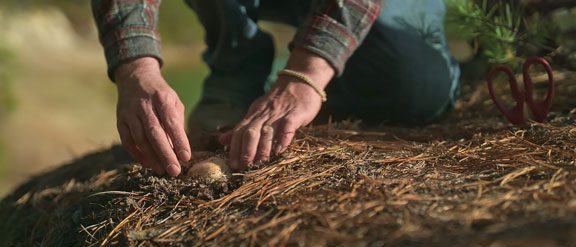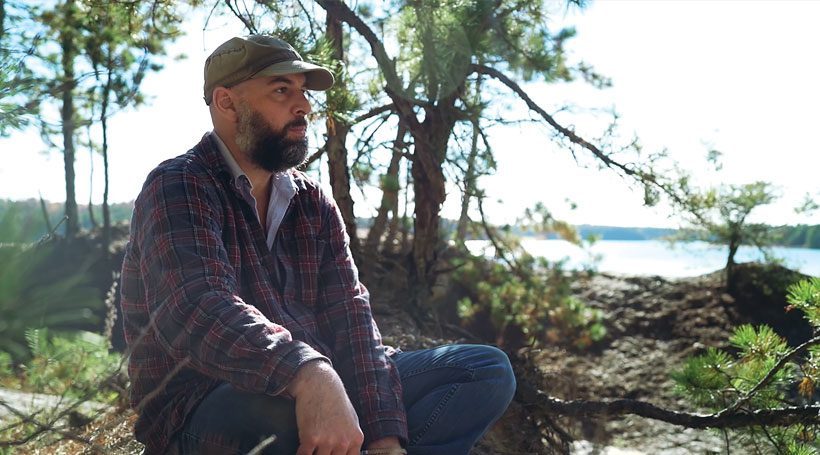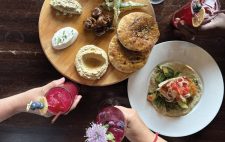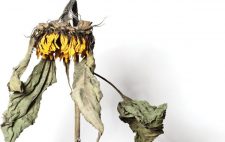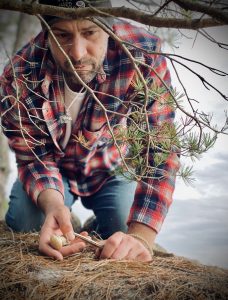
Photo by Keara Giannotti
One South Jersey chef goes into the wild to find extra-special ingredients for his restaurant. A new documentary follows his unique methods that give farm to table a whole new meaning.
Some chefs have the in – getting first dibs on the harvest from a local farm or being first at the dock for the most recent catch. But those chefs have nothing on Phil Manganaro.
A 6-hour hike into the Pinelands for mushrooms. A trip with his son once a year to Maine. North Jersey. The Jersey coast. Even the Poconos. Manganaro skips the farmers’ markets and heads into the great outdoors to gather ingredients that he features on his constantly changing tasting menus at Merchantville’s Park Place Café and Restaurant.
Instead of foraging – the term used for gathering ingredients in the wild – Manganaro refers to his operation as wild farming.
“I know where the ingredients are now, and I can go check on them,” he says. “I have an idea when they’re going to come out, and I keep a running inventory of how much I get every year, what I make and how much of it I make each year.”
“I don’t even know if I could do this elsewhere, I would figure it out, but New Jersey has such a diversity of ingredients.”

East Coast scallops with charred preserved ostrich fern and ostrich fern frond dust; Bone marrow butter roasted cod loin with eastern red bud flowers; Unripe blueberries at sunset in the pines
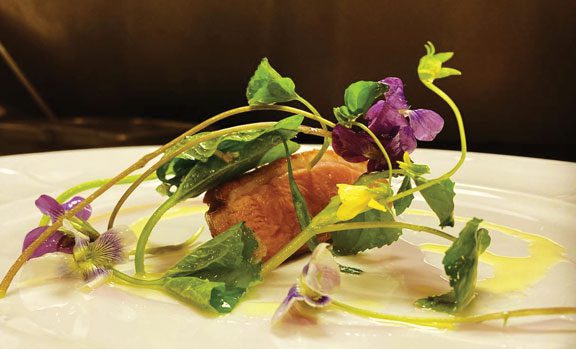
Lard seared duck breast with tossed Woodland’s violets and greens and Violet flower syrup
At Park Place, the seasons rule the menu. Manganaro creates a tasting menu that’s different for each night’s seating, with doors open only on Thursday, Friday and Saturday.
“It’s more controlled and allows me to be more creative that way,” he says. “I could have four different menus in one night. I send the menu out to people on Mondays, and if they come back to me like ‘oh, we don’t want to have this,’ I suggest something else. It also allows me to make sure everybody’s eating something they truly want to eat.”
In case you were wondering, not many people ask to change their menu. And part of that is the quality of the ingredients. “Take a blueberry, for example,” Manganaro says. “When you taste a blueberry that I went out and picked, it makes things that you buy at the supermarket almost flavorless.”
On any given night at Park Place, you’ll find first-time diners, returning foodies and loyal regulars. Like Anastasia and Steve Forde, founders of Forde Films.
“The first time we went to the restaurant, our kitchen was being redone and I found it on Yelp,” says Anastasia. “It was a Thursday and somehow there was a table available. We had mint ice cream for dessert and I started to tear up. Growing up, my family had a garden, and we would just pick a mint leaf on our way to school, like instead of a Tic Tac, and that’s what this tasted like.”
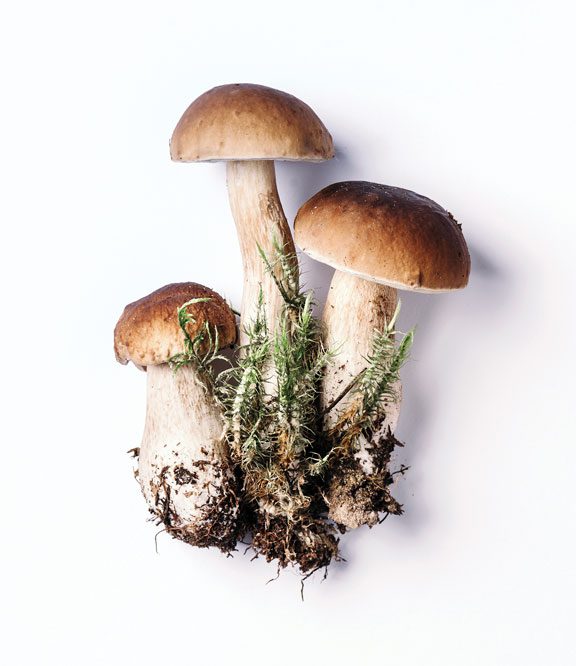 With such a moving experience over dinner, it’s no surprise that the Fordes continued to frequent the restaurant, getting to know Manganaro better with each visit. They eventually raised the idea of making a documentary.
With such a moving experience over dinner, it’s no surprise that the Fordes continued to frequent the restaurant, getting to know Manganaro better with each visit. They eventually raised the idea of making a documentary.
The group set out to make a 7-minute short doc about Manganaro’s work. A professional film crew, led by the Fordes, followed him for 3 days as he visited a few of his wild farming sites, and Manganaro’s 12-year-old son, Dean, accompanied him and shot footage during other trips.
“The day we went to the Pine Barrens to find the mushrooms, it was so quiet and peaceful,” says Anastasia. “And it’s not like you can even see where the mushroom is when you’re just walking around. Phil knows to look for this little bump of Earth and then he finds this mushroom.”
“FOUND: The King of Matsutake Ridge” premiered to a small group of family, friends and peers last year, and the group has since submitted it to several film festivals. It will be featured in the NJ International Film festival, and available for live-streaming on June 8. The finished film runs for 34 minutes.
“We felt like cutting the film short, to 7 minutes, wasn’t doing the story justice,” Steven says. “Phil and us, we love rare ingredients. He’s our rare ingredient, and we want to share him with as many people as possible.”
Manganaro first began searching for rare ingredients about 7 years ago, when he foraged for mushrooms in the Pine Barrens and started making his own root beer.
“When I was first learning how to do this, I would go to pick blueberries and see some other berries during the trip,” Manganaro says. “It all happened because I was getting one thing and noticed 3 others. That was back when I was foraging.”
But a big reason it grew into the success it is today may surprise you (or not): New Jersey.
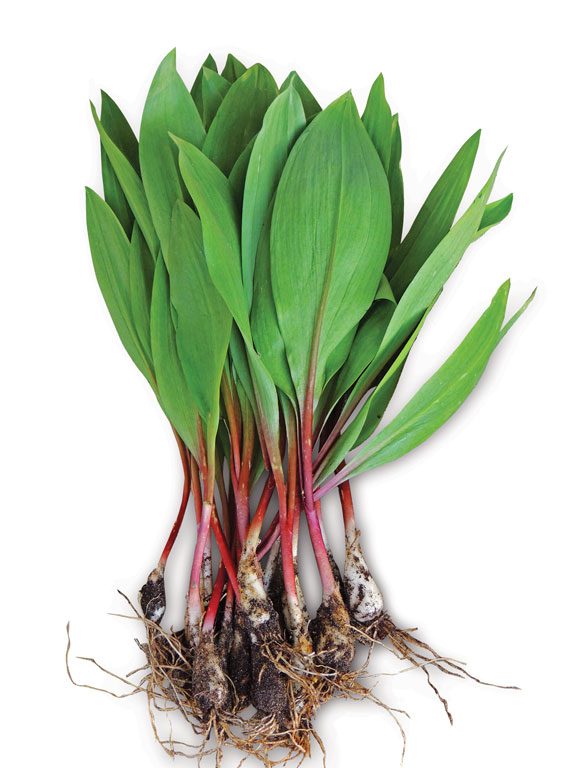 “I don’t even know if I could do this elsewhere,” Manganaro says. “I would figure it out, but New Jersey has such a diversity of ingredients. The southern plants hit their northernmost limit right around South/Central Jersey, and the northern plants hit their southernmost limit at the same line. And we have the oceans with such beautiful aqua diversity. I’m born and raised in New Jersey, and I think it gets a bad rap. So I love the fact that I’m doing this here.”
“I don’t even know if I could do this elsewhere,” Manganaro says. “I would figure it out, but New Jersey has such a diversity of ingredients. The southern plants hit their northernmost limit right around South/Central Jersey, and the northern plants hit their southernmost limit at the same line. And we have the oceans with such beautiful aqua diversity. I’m born and raised in New Jersey, and I think it gets a bad rap. So I love the fact that I’m doing this here.”
But don’t mistake Manganaro’s passion for this work to mean it’s easy. Just because the restaurant is open only 3 days a week doesn’t mean he’s kicking his feet up for the rest of the time.
“It’s the hardest job I’ve ever had,” he says. “I’ll work 40 to 50 hours a week at the restaurant, but then in the peak seasons of some ingredients, I’ll also pick for 20 to 25 hours. And I don’t always feel like doing that.”
Manganaro’s hard work and extra care can be seen in the way he harvests his ingredients, choosing to do his wild farming ethically. It’s great for the sustainability of the ingredients, but also means more time and precision.
“Take ramps – they’re little wild onions,” he says. “They grow in a rocky, clay soil. I have to work each one out of the ground and I have to move around because the plant takes 7 years to seed. So I pick 5 from here, move down, pick 5 from there and so on. But commercial foragers come in, and they’ll just clear out the whole area.”
While guests who have dined at Park Place rave about the chef’s unique and one-of-a-kind take on eating, Manganaro may not completely agree that it’s one-of-a-kind. Although he acknowledges it’s been awhile since flavors like these have been enjoyed.
“These ingredients have always been on the earth,” he says. “5,000 years ago, Egyptians used the mustard plant. I have older people come in and say ‘my grandfather used to go get this, this and this’ and now the grandson doesn’t go get anything. It’s a lost art, gathering your own food.”
